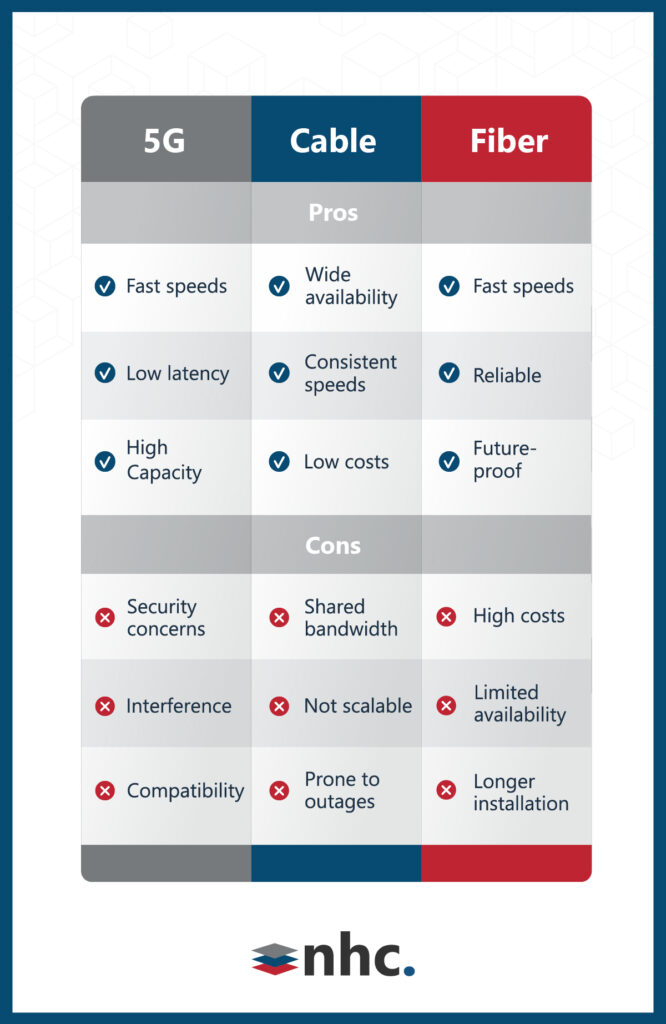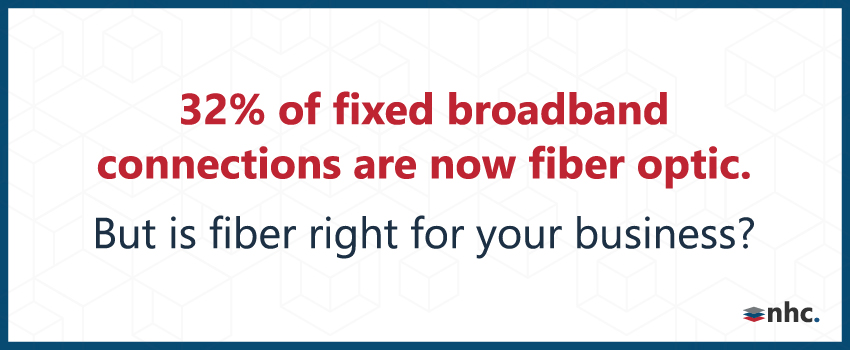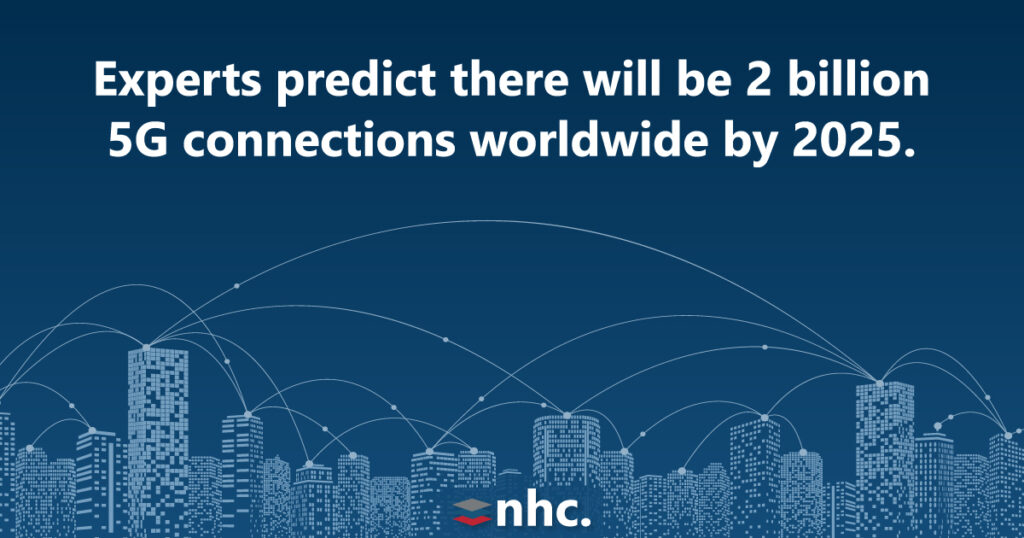5G, Cable, and Fiber: A Side-By-Side Comparison
Finding the best internet connection to meet your business needs can be tough with so many options available today. In this blog, we compare the current internet heavyweights – 5G, cable, and fiber – to help you decide which connectivity type is right for your business.
5G Internet
5G is still a fairly new technology, but businesses are already leveraging its faster speeds and reliability. Experts predict there will be 2 billion 5G connections worldwide by 2025,1 and its high availability is a big reason why more organizations are hopping on board.
5G networks offer broad coverage, enabling businesses to tackle challenges typically associated with wireless service. Let’s take a look at the pros and cons of using 5G for business internet:
Pros
- Speed – 5G boasts significantly higher speeds than previous generations, so businesses can enjoy faster file transfers, high-quality video conferencing, and seamless collaboration.
- Latency – 5G networks offer lower latency, which companies can leverage to optimize technologies like IoT devices, remote monitoring, and real-time communications.
- Capacity – 5G networks can handle a larger number of connected devices, allowing businesses to scale operations more easily by adding more users, locations, or devices.
Cons
- Security – 5G is more secure than 4G, but companies may still encounter cyber security issues – especially as the number of IoT devices and network-enabled components increases.
- Interference – The high-frequency bands 5G networks operate on have shorter ranges, making them more susceptible to interference from obstacles like forests or tall buildings.
Compatibility – Businesses need compatible devices, such as 5G-enabled smartphones, routers, and IoT devices, to connect to 5G networks. Existing devices may need to be upgraded or replaced, which can add costs.

Cable Internet
As one of the oldest options for connectivity, cable is a tried-and-true way for businesses to access high bandwidth at very low costs. Cable internet refers to broadband internet that leverages the same infrastructure used for cable television service. Thanks to its ease of use, cable still provides high-speed internet access to people worldwide.
Here are the pros and cons for businesses using cable internet:
Pros
- Availability – Cable internet is widely available in urban and suburban areas, reducing the risk of limited connectivity options and enabling businesses to access it quickly and easily.
- Consistency – Cable internet typically provides consistent speeds throughout the day, so organizations can expect a consistent and reliable connection for their daily operations.
- Cost Savings – Since multiple businesses in the same area can share the same cable infrastructure, costs are often lower than other internet types since they’re distributed among each user.
Cons
- Bandwidth – While shared bandwidth can mean lower costs, it can also lead to slow speeds and reduced performance during peak usage times if multiple businesses in the same area use the internet.
- Scalability – Cable internet isn’t easily scalable since it depends on existing infrastructure. As businesses grow, cable may be unable to accommodate evolving bandwidth or networking needs.
- Outages – Cable networks are susceptible to outages caused by cable damage or power disruptions, which can impact operations, customer service, and productivity until the issue is resolved.
Fiber Internet
Fiber internet is increasingly popular – 32% of fixed broadband connections are now fiber optic.2 It’s easy to see why, considering fiber is one of the fastest, most reliable types of internet available. But fiber often comes at a high cost for organizations, leaving many wondering if it’s the best choice.

Pros and cons of using fiber for business internet include:
Pros
- Speed – Fiber internet provides high-speed internet connectivity and symmetrical upload and download speeds, which enables smooth video conferencing, easy file sharing, and reliable access to cloud services.
- Reliability – Fiber cables are less prone to interference from electromagnetic signals, weather conditions, or electrical disturbances, resulting in a more stable connection.
- Future-Proof – Fiber technology is considered future-proof since it can support higher speeds and emerging technologies without needing to make significant infrastructure upgrades.
Cons
- Cost – Fiber internet may be more expensive than other connectivity types due to its high installation and maintenance costs.
- Availability – Fiber availability varies depending on location. While it’s becoming more common in urban areas, rural and remote areas may have limited or no access to fiber networks.
- Installation – Fiber internet requires professional installation and setup, which can add time and cost compared to other types of internet connections.
NHC: Your Single Source for Connectivity
Choosing the right internet depends on specific business requirements. Luckily, NHC is your single source for every connectivity need. We’ll leverage our nationwide carrier partnerships to help you find the best-fit internet as part of our holistic technology solution.
From fiber to copper and LTE/5G, we can provide the network connectivity your end customers need to stay competitive. Plus, partners get an additional upfront bonus for selling our 5G Fixed Wireless solution, which offers even greater speeds and reliability. Contact NHC today to learn more.
Sources:



